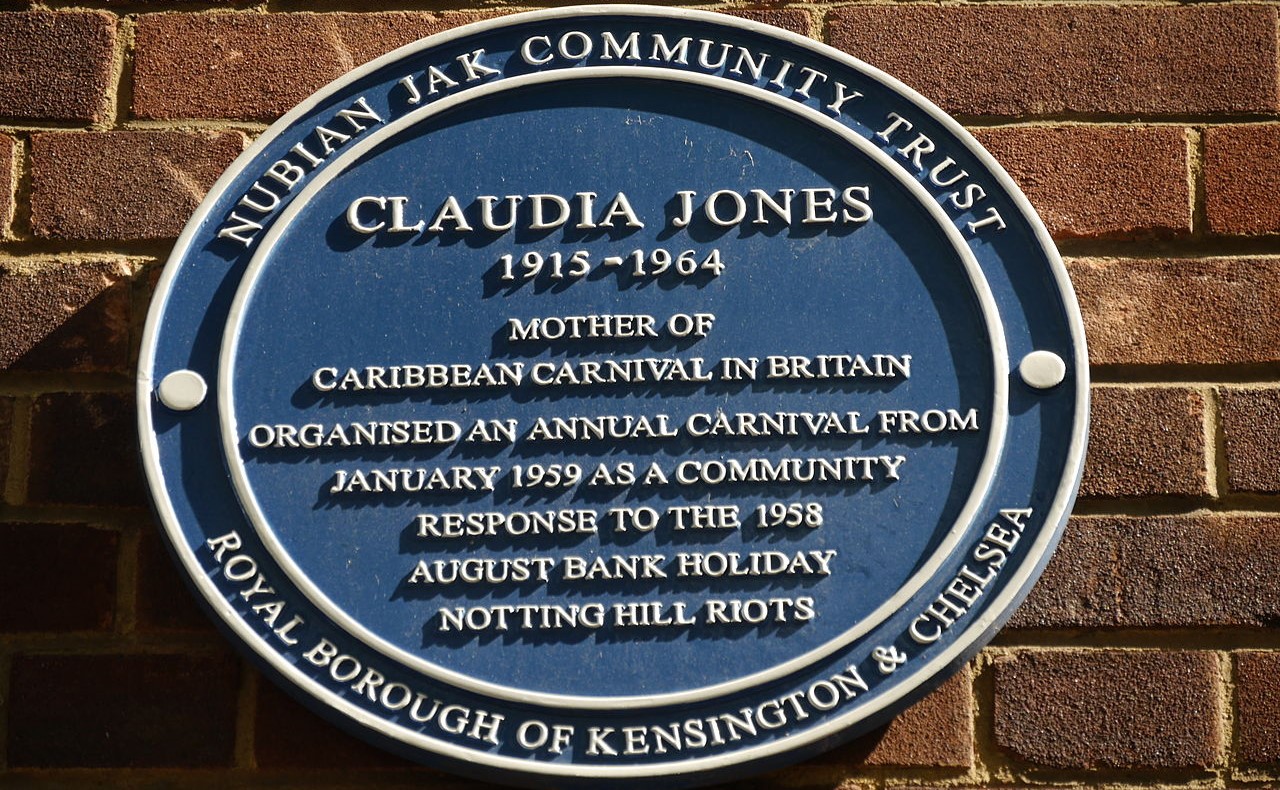Claudia Jones: The American Communist who founded Notting Hill
Posted by Pete on 21st Feb 2024
Claudia Jones, born 109 years ago today, was deported by the US and left her mark on Britain instead

Claudia Jones blue plaque in Notting Hill, London. Credit: Wikipedia / EdwardX
The Notting Hill Carnival was founded by a communist.
Claudia Jones was born on this day in 1915, in British-ruled Trinidad. She remains one of the most remarkable black radicals of the twentieth century.
The US Communist Party was one of few organisations willing to fight anti-black racism in the interwar period, attracting activists including W.E.B. Du Bois
See the W.E.B. Du Bois tea towel
Jones was born into a colonised working class under British rule.
Like many in Trinidad, her family moved to the U.S. during the economic downturn after First World War. But life was hardly easier in America.
Jones’ family settled in Harlem, New York. Claudia continued to grow up in poverty, and contracted tuberculosis when she was 17 due to the lethally poor housing conditions imposed on poor black families in the city.
Claudia Jones knew personally the injustice of being black and working class – and she wanted to fight back.
Like many black workers and intellectuals in the 1930s, Claudia turned to the Communist Party (CPUSA).
The CPUSA was one of the few political organisations in the interwar U.S. to fight anti-black racism head-on.
This uncompromising position attracted many black activists to join or else support the Party, including Paul Robeson, Langston Hughes, and W. E. B. DuBois.
Jones joined the U.S. Young Communist League in 1936, eventually becoming its national chairperson.
She became a regular contributor to Party newspapers such as the Daily Worker, and she was active in anti-imperialist protests against Mussolini’s Italian invasion of Ethiopia.
Claudia Jones was one of several black activists, including singer Paul Robeson, to support the US Communist Party
See the Paul Robeson tea towel
Jones soon emerged as an original critic of U.S. capitalism, in particular by combining the struggles against capitalism, racism, and patriarchy.
In a 1949 article, Jones argued that working-class black women had immense potential for revolutionary politics, as keystones of working-class communities.
"The capitalists know, far better than many progressives seem to know, that once Negro women begin to take action, the militancy of the whole Negro people, and thus of the anti-imperialist coalition, is greatly enhanced."
But Jones’ communist politics landed her in hot water during the Red Scare. As an immigrant, too, she was especially vulnerable to persecution by the state.
During the late 1940s and early 1950s, Jones was imprisoned on various occasions under anti-communist legislation since ruled unconstitutional, and in 1955 she was deported outright.
But Jones wasn’t sent to Trinidad, her birth country. The British colonial regime there was worried that such a skilled activist would undermine imperial rule on the island.
Instead, Jones was sent to England.
She settled in London and got straight into left-wing politics in her new home.
In London, Jones found similar problems of racist discrimination against the non-white working class to the ones she’d witnessed in the U.S.
After the Notting Hill race riots of 1958, when white mobs attacked the houses of West Indian immigrant families in the area, Claudia Jones had an idea: the British black community ought to respond with a carnival, drawing on the cultural traditions of their diverse Caribbean heritage.
Jones was key to organising the Mardi-Gras festival that followed at St Pancras Town Hall in January 1959, under the slogan:
"A people’s art is the genesis of their freedom."
The St Pancras event is now seen as the direct precursor of the now-famous Notting Hill Carnival which launched in 1966, although Jones didn’t quite live to see the full fruit of her labour.
After spending her last years campaigning against new, racist legislation designed to reduce non-white immigration to the U.K., Claudia Jones died on 9 January 1964.
She’s buried in Highgate cemetery, a few places away from her ideological inspiration, Karl Marx, and remains an icon of black radical history across the Atlantic world.


